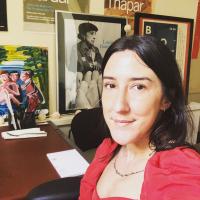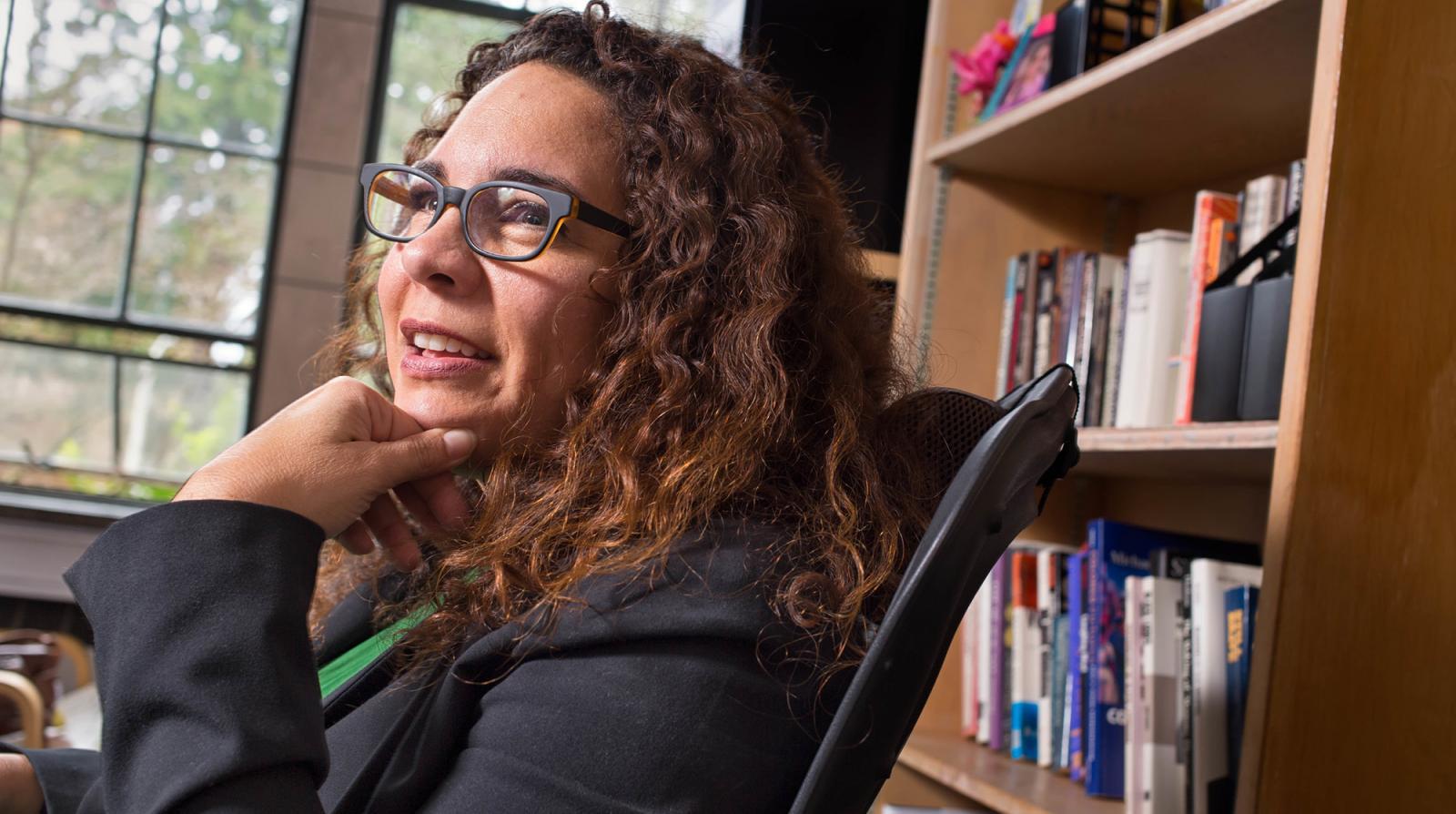
“This class is extending essential dialogue...conversation that I believe is already making our community a better place."
On the night after the 2016 presidential election, fifty students and alumni gathered in the Samuel E. Kelly Ethnic Cultural Center Theater. The mood was funereal as everyone took their seats and waited for Professor of Communication Ralina Joseph to get them started. For the past month, the group had been meeting weekly for intergenerational dialogue around issues of race as part of a ten-week course called Interrupting Privilege. Though those in attendance had signed up for challenging conversations meant to push them out of their comfort zones, that night felt particularly charged with anxiety, fear, shock, grief, and anger. Shock at how high the tide of hate had grown, anger at that shock, fear of what was to come, anxiety over how to respond. Joseph could feel it all as soon as she walked in the room.
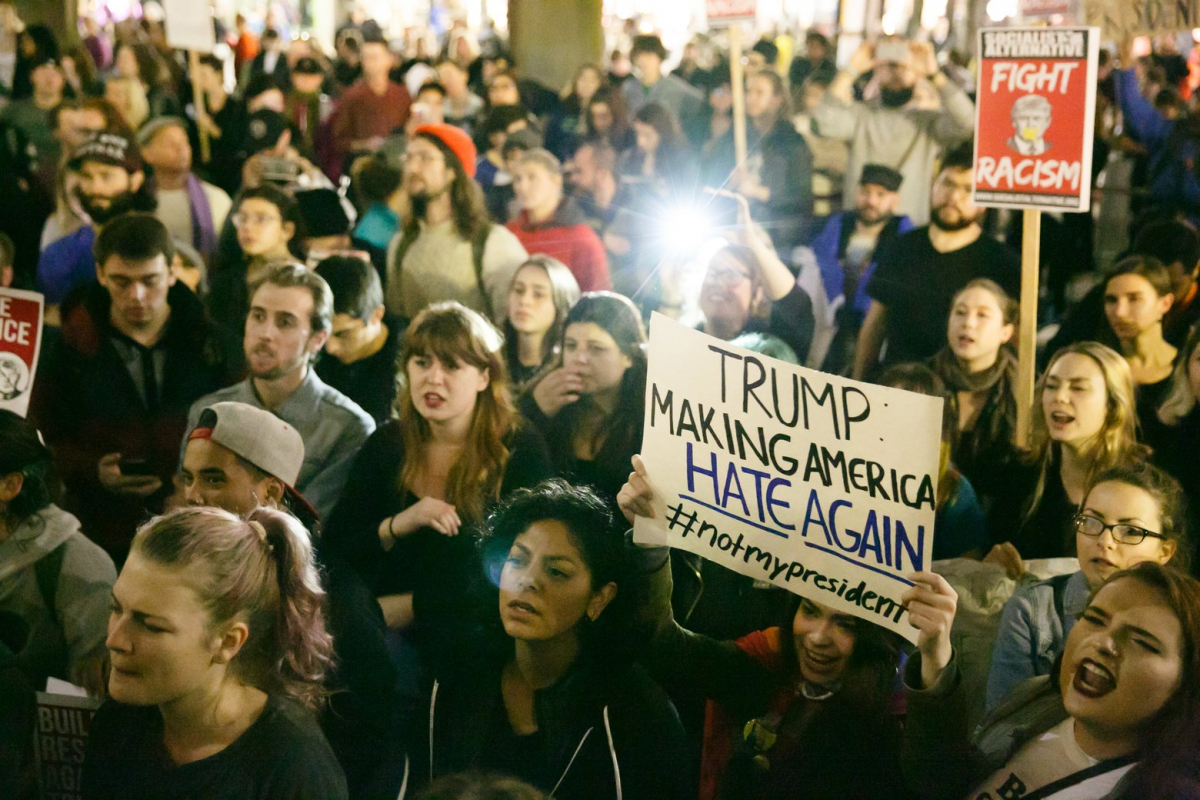
Rather than extinguish that charge—or let it run wild—she harnessed it. After all, Joseph had developed Interrupting Privilege for the purpose of helping people learn how to productively listen to and converse about these exact issues outside of their race and age bubbles. Both a class and a philosophy, Interrupting Privilege is an intergenerational, skills-building, anti-racism space of dialogue and critique that argues that everyday people can work together across generations and race to combat racism with the support of youth leadership, commitment to critique-in-action, spaces to share and hear racial hurt, and careful training modules. For the next two hours, Joseph modeled how to critique with love and how to engage in radical listening, fostering a space where people felt safe to acknowledge what they didn’t know, ask questions, and make mistakes, while the most vulnerable voices were centered and lifted up.
For students like Embeba Hagos, the interracial and intergenerational space Joseph cultivated was a revelation. “I felt as though institutions like UW didn't care about racial equity. But when I started seeing people in my Interrupting Privilege class share their own experiences and be emotional in front of so many people, it was inspiring, because it gave me hope and courage to be that vulnerable, to be comfortable with my own experiences outside of my friends and family, especially at UW.”
Alumni like Salley Anderson also describe Interrupting Privilege as “life-changing.” “It was the right thing at the right time,” Anderson says. “It literally changed how I walk through the world, changed what I see, and cracked me wide open to view the world in a different way.”
For both Hagos and Anderson, the success of Interrupting Privilege, which is now in its third year, is due to Joseph. From students and facilitators to alumni and administrators, everyone involved with Interrupting Privilege says that Joseph’s profound ability to facilitate and model thoughtful, nuanced, and open conversations on difficult topics like race and privilege has been a godsend in a time of social media silos and increasingly polarized politics.
It is also for this work that Joseph was recently awarded an inaugural Mellon/ACLS Scholars & Society fellowship. The Scholars & Society fellowship offers faculty a stipend of $75,000 plus $6,000 for research and project costs for programming that promotes the public value of humanities scholarship. The funds will allow Joseph to write both scholarly and popular works based on what she has learned as a race scholar and facilitator, as well as support the program’s move from the UW campus to Seattle’s Black community hub, the Northwest African American Museum (NAAM), where the class will also include the voices and perspectives of local high school students of color.
“It is a natural partnership for us and the work that we do and mission we strive for,” says NAAM director LaNesha DeBardelaben. “We are so much more than a museum, we are a gathering space, and [Interrupting Privilege] fits with our identity as a place for transformation, education, and liberation.”
“Don’t put me on the stage. Let’s do something different.”
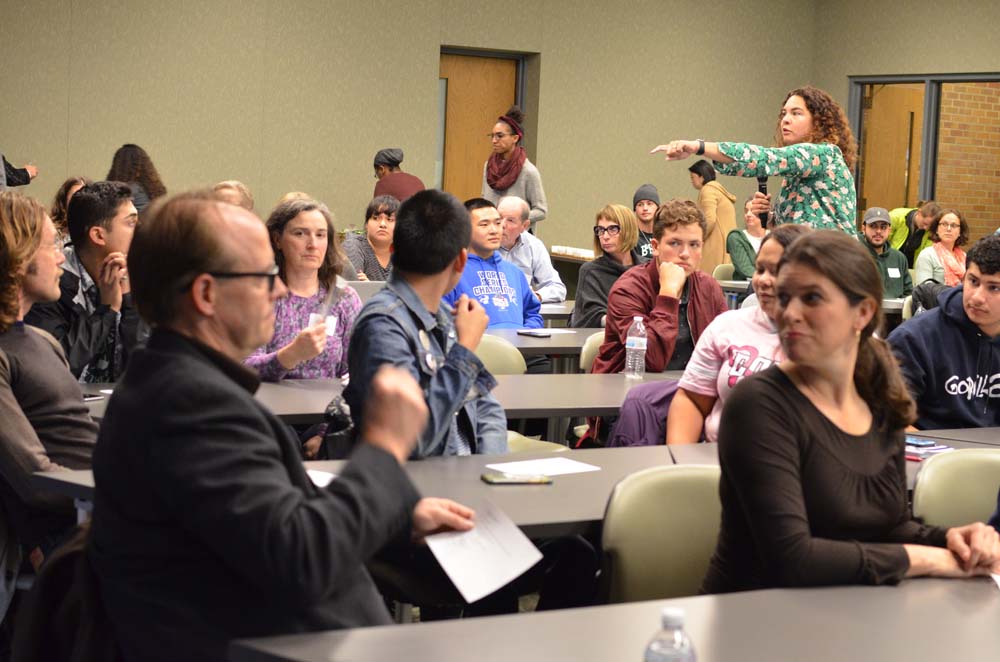
Interrupting Privilege first began in the spring of 2016, when the UW Alumni Association (UWAA) leadership team approached Joseph. That January, Joseph gave a public lecture titled “What’s the Difference with ‘Difference?” as part of the Graduate School’s Equity and Difference Series. Her lecture, which examined—and effectively advocated for—the cultural shift away from terms like “tolerance,” “multiculturalism,” and “diversity,” to words like “difference” and “equity,” had been well attended by alumni, who craved to learn more.
“Many of our members were fired up after the Equity and Difference Series and were asking us, ‘what’s next?’ At the time, there wasn’t really a program that served their needs, so we went to Ralina and asked if she had any ideas for how we could aid these alumni in taking a deeper dive into these issues,” says Terri Hiroshima, UWAA’s Sr. Director of Marketing & Communications.
Indeed, Joseph did have some ideas: “Don’t put me on stage,” she told them.
“I wanted to work with people to create tools together and be in a collaborative working group space. I bristle at the notion that we need to hold up one singular figure. That’s a very patriarchal approach and if I’m truly creating antiracist and feminist spaces, then we have to do it another way,” Joseph says.
During that meeting with UWAA leadership, the group discussed the general dearth of interracial and generational spaces to talk through issues of race. “The way so many of us operate is in race bubbles, but also in age specific groups,” Joseph says. “In order for true systemic change to happen, we need everybody.”
From there, in partnership with UWAA, Joseph decided to create the Interrupting Privilege class, in which there’d be a 1:1 pairing of 25 undergrads and 25 alumni who would meet weekly throughout the quarter. After advertising the course in UW’s alumni magazine, Columns, it filled up in less than 24 hours. Anderson, who hadn’t been back to UW since graduating in 1985, was among those who snagged a spot. “Everyone, particularly in the nonprofit sector, is talking about issues of diversity, equity and inclusion,” Anderson, who works for the Bullitt Foundation, says. “But how do we go beyond issues of hiring more people of color? How do we actually change our systems and embody those values? I didn’t know how to do that and I was so hungry to learn.”
While each iteration of Interrupting Privilege includes more than 50% people of color who range in age from their early 20s to their late 70s and come from vastly different life experiences, Joseph says they all hold one thing in common: “One thing about all the people who sign up for our class is that they want tools for change. They don’t all know how to get there, but they are all really invested.”
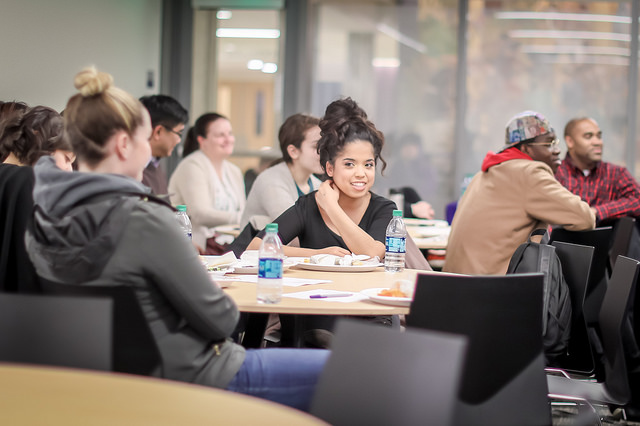
At first, the class was organized more like a traditional course, where Joseph would assign readings, give lectures and lead workshops, while participants were also required to attend a variety of lecture series. “We realized more and more that while people really enjoyed the lectures, they were hungry for more connection time with each other, especially when the election happened,” Joseph says. “Had this been a lecture series, we wouldn’t have been able to cry together in the same way, talk in the same way, collaborate in the same way.”
At the heart of Interrupting Privilege, Joseph says, are two goals: to learn how to listen and to learn how to interrupt everything from microaggressions to colorblindness. In order to center and lift up the voices of students of color, Joseph has also recruited a number of student facilitators who model those listening and speaking skills for everyone in the room. One of those student facilitators is Kenneth Applewhaite, who recently completed his honors thesis on sexual racism in Seattle’s queer community (a project which Joseph advised) and who will be graduating this year.
“On the UW campus, there are a lot of programs in place to help combat that feeling of isolation and disconnect from one’s different identities, be they racial or sexual, but not a lot that address the intersection of those identities,” Applewhaite says. “I was attracted to Interrupting Privilege because it centers intersectionality and explores how people experience more than one type of oppression.”
Like Anderson and Hagos, Applewhaite says that participating in Interrupting Privilege has also changed how he moves through the world and engages in conversations about race. “Ralina never attacks someone for what they believe. Instead, she provides counternarratives or asks questions or tries to understand where someone is coming from. She’s never coming from a place of isolation, but from education. Working with her has made me more confident in how to handle hard conversations with friends and family and in everyday interactions.”
Anderson says the same. Alongside continuing to build on what she learned in Interrupting Privilege—“This is lifelong learning and I’m going to be unpacking this for the rest of my life,” she says—Anderson has brought the tools she gained in Interrupting Privilege to her workplace, where she’s conducted antiracist system analyses that have resulted in increasing pay for employees of color and dismantling what she refers to as her “colonized models” of management. “There is no way I would have seen this operating before,” she says.
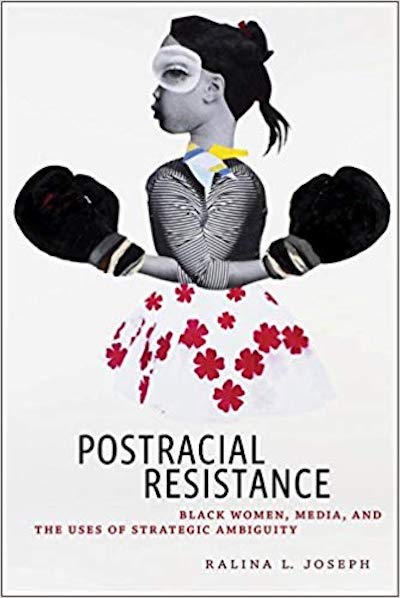
Joseph—who was also recently awarded the International Communication Association 2019 Outstanding Book Award for Postracial Resistance: Black Women, Media, and the Uses of Strategic Ambiguity—says she’s learned a great deal, too. “I’ve learned a lot of really tangible skills, including how to translate my work, because I have to take it into this intergenerational community that has really nuts and bolts questions about race and racism,” she says. “It forces me to have to explain these things in very tangible ways and, in doing so, I feel like I leave the sessions with so many different things that I’ve learned.”
On to NAAM—then Nationwide
Indeed, it’s being able to translate her work and connect with audiences within and beyond the academy that has earned Joseph the reputation of being a highly effective and magnetic model of a publicly engaged scholar. “The orbit of Interrupting Privilege is ever-expanding, with this next step in Ralina Joseph’s work in racial justice engaging communities beyond the campus in new and creative ways,” says Kathy Woodward, Director of the Simpson Center and Professor of English.
Thanks to the Mellon/ACLS Scholars & Society fellowship, Joseph will spend the 2019-2020 academic year extending Interrupting Privilege and engaging larger publics in a number of ways. First, beginning this fall, Interrupting Privilege will be based at the Northwest African American Museum (NAAM), where it will include high school students and community members alongside UW doctoral students, who will help facilitate class sessions. Part of the goal in basing Interrupting Privilege at NAAM, with which Joseph has partnered on previous projects, is to center Seattle’s black community, as well as to lift up and build off NAAM’s longstanding work in the realm of justice and equity, as well as arts and culture.
While Joseph and her collaborators have worked hard to ensure that people of color represent the majority of each Interrupting Privilege class, it has often been the case that “White participants often take up much of the space, even when they are the numerical minority, and even when the space has been constructed around empowering participants of color,” Joseph says. Furthermore, from $15 parking fees to our forty-year history of maintaining troubling-low numbers of Black students, the UW campus is not a welcoming space for many of Interrupting Privilege’s community members. Therefore, the move “rejects the dictates of our exclusionary histories by re-centering the program in the identities, cultures, and communities of Black Seattleites,” says Joseph.
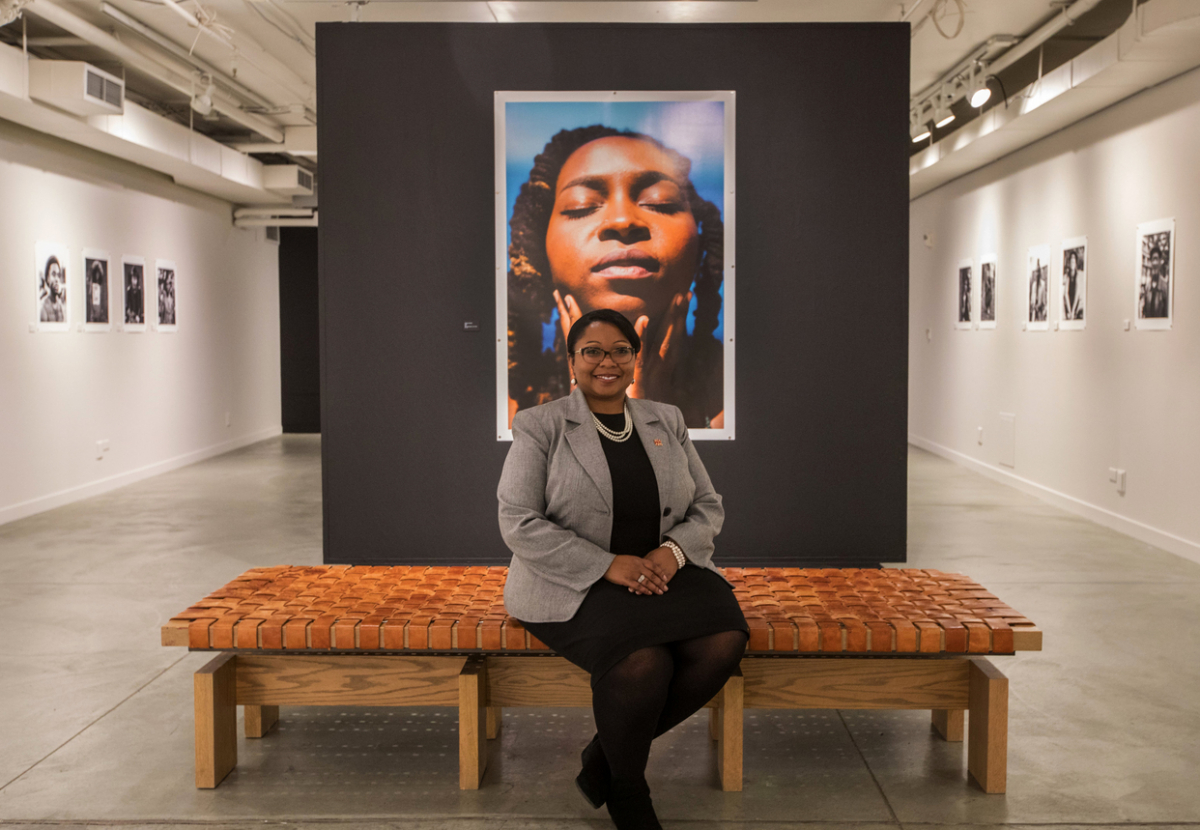
In preparation for Interrupting Privilege’s first NAAM session this fall, the museum’s director LaNesha DeBardelaben participated in the UW-based class this past spring and was pleased by what she experienced. “This class is extending essential dialogue,” DeBardelaben says. “It’s helping to create conversation that I believe is already making our community a better place. Each session is so uniquely empowering, from the very first session, when we gathered in a circle and we each self-identified in various categories, from gender and ethnic identities to faith and ability. It was insightful to see the common ground that we all share. The course activities have been very strategically and intentionally focused on building our sense of community, cohesion, and collaboration. It really helps everyone to connect with people they would otherwise not know.”
Based on what she has learned as a race scholar and facilitator, Joseph is also working on Interrupting Privilege: The Promises and Perils of Talking Race and Fighting Racism, a collection of essays explicitly written for crossover audiences that asks “how do we call each other in instead of calling each other out when we experience or bear witness to someone else experiencing racism?”
Finally, Joseph will be working on taking Interrupting Privilege nationwide. “As we run the program at NAAM, we’ll be thinking about how we can duplicate this and make it work nationwide and in a variety of spaces,” Joseph says.
“Teaching people how to have conversations about race is hard. But we have to do it, because what we have right now isn’t working.”
